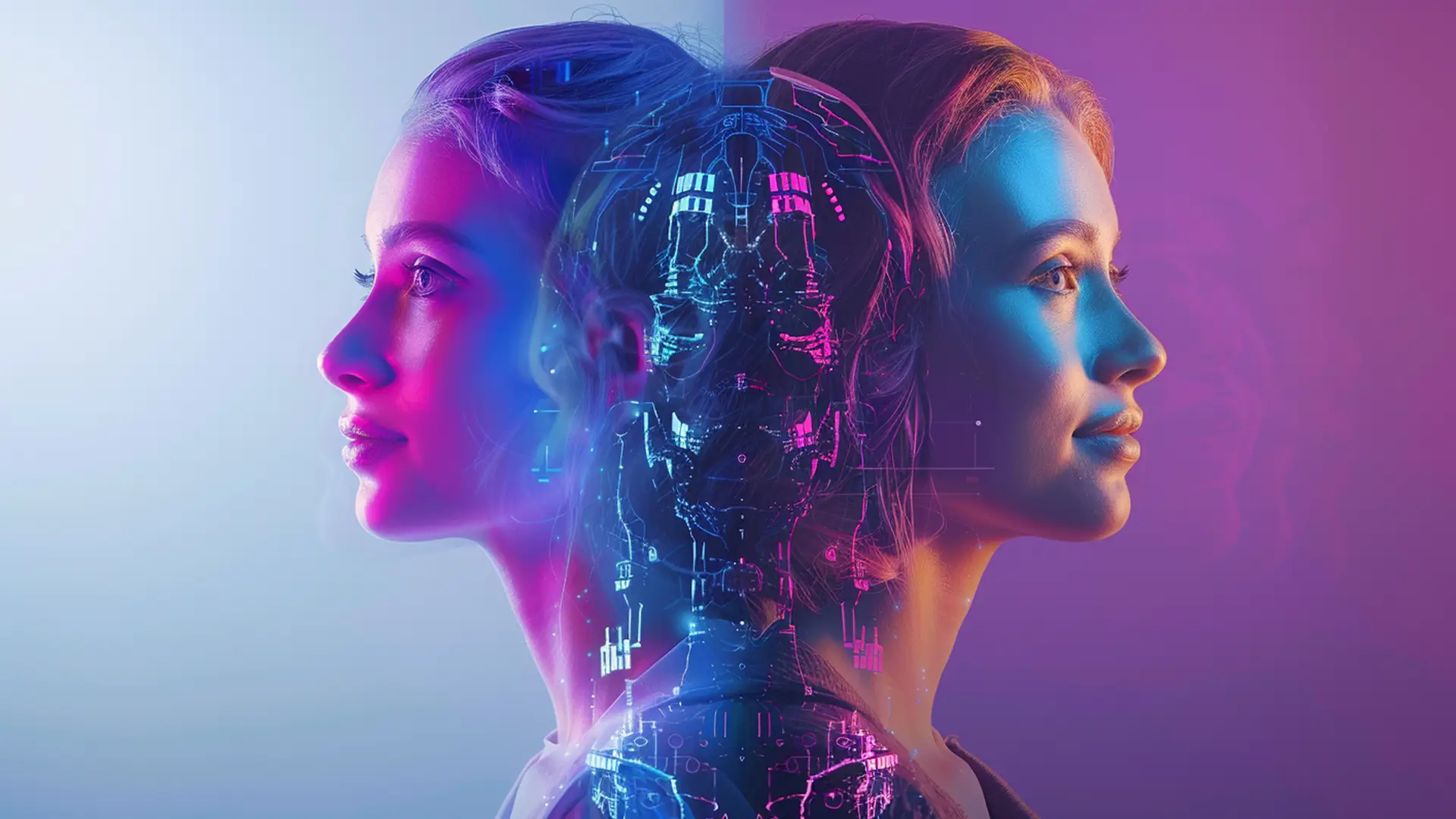Key Takeaways
- AI is becoming an integral part of enhancing marketing strategies and operational efficiencies.
- AI's involvement in content creation allows teams to focus on more strategic and creative endeavours.
- The interplay between AI efficiencies and human intuition in marketing is becoming increasingly central.
- To maintain a competitive edge, companies must customize their marketing strategies and tactics to align with individual brand voices and customer needs.
- Organisations need to take proactive steps to ensure employees are equipped to collaborate effectively with AI technologies through upskilling initiatives.
- Integrating AI in the workplace can lead to increased efficiency, more informed decision-making processes, and, ultimately, higher return on investment (ROI) for companies.
As Aquent's Chief Marketing Officer, I've witnessed the profound transformation that artificial intelligence (AI) is bringing to the marketing industry. The traditional reliance on intuition and time-consuming research and analysis has been replaced by quicker, data-driven strategies powered by AI. With so many AI tools for marketing becoming widely available, this technology is no longer optional—but a critical component in shaping modern marketing dynamics.
At Aquent, we're actively embracing this evolution, integrating AI tools to elevate our marketing strategies and boost operational efficiency. This shift is not only reshaping our professional landscape but also highlighting the ethical considerations arising from AI's increasing role.
This transition foreshadows a near-term reality: if not properly harnessed, AI may soon replace human tasks in certain elements of marketing. To ensure healthy coexistence, a balance must be struck that takes advantage of irreplaceable human ingenuity and mechanical accuracy.
We learned valuable insights about how technology is shaping our operations after conducting a thorough analysis of our team's AI usage. AI has permeated every aspect of our work, from routine tasks to complex decision-making. The patterns of AI usage unveiled through our data analysis are not just fascinating, but also provide a roadmap for future strategy and innovation.
AI as a tool for enhancement
We genuinely empathise with and validate the concerns that may surface about job security when integrating artificial intelligence into the workplace. Rest assured, our company is firmly committed to harnessing the benefits of AI, while also ensuring the stability and growth of our current workforce.
We believe that the increased effectiveness and efficiencies provided by AI tools will not only accelerate speed to market but will also enhance decision-making processes, ultimately leading to a higher ROI and increased sales.
By augmenting our team's capabilities with AI, we have automated routine tasks and assisted with content creation. This has allowed us to shift our focus more toward strategic and creative endeavours.
Revolutionising content creation in creative domains
Content creation, previously a manual process marked by extensive research, idea generation, and the drafting of outlines and content, has been radically transformed by AI. Rather than replacing the work of crafting social media posts and writing email copy, AI has emerged as an invaluable ally in these tasks, greatly enhancing both efficiency and effectiveness.
This underscores a clear trend: AI is increasingly being used in creative domains such as social media content, copy, search engine optimisation (SEO) research, image generation, and blog narratives. This integration has not only boosted our SEO but has also increased engagement performance with our audience. Moreover, we've found that AI applications strategically lighten the manual workload, reinforcing their critical role in today's tech-driven environment.
Here are some ways our team is using AI to create content:
- Idea Generation: With the help of AI tools like ChatGPT and Gemini (formerly known as Bard), we can analyse audience engagement data to generate content ideas that resonate with our target market.
- Content Outlining and Drafting: AI helps in creating content outlines and writing first drafts, which are then refined by our team, ensuring a blend of AI efficiency and human creativity.
- Generating Email Campaigns: AI models assist us in crafting draft content for email marketing campaigns. These drafts are then personalised and fine-tuned by our team to ensure they align with our brand voice and appeal to our audience.
- Social Media Content Generation: We use AI to generate engaging social media posts. AI tools can analyse trending topics, hashtags, and audience preferences, allowing us to create relevant and timely content. This not only increases our brand's visibility but also boosts audience engagement.
- SEO Research: With the help of AI and tools like Surfer SEO and Ahrefs, we have significantly improved our SEO research capabilities. By analysing search patterns, keywords, and user behaviour, these tools provide us with valuable insights that inform our content strategy. This has led to higher rankings on search engines and increased organic traffic to our website.
- Image Generation: We use AI, specifically Midjourney and Photoshop, to generate original images for our blog posts and social media content. These tools enable us to create visually appealing graphics based on specified themes or concepts, saving us significant time and effort.
- Blog Content Development: Our team leverages AI tools like Jasper, QuillBot, Gemini, and Grammarly to draft blog narratives. These tools generate a rough draft based on the given topic, which our writers then refine and enhance. This has significantly reduced the time spent on drafting and allowed our writers to focus more on creativity and storytelling.
AI integration in daily workflows
- Adapting Copy for New Channels and Audiences: We leverage AI to adapt our content for new channels and audiences quickly. This allows us to maintain relevance and engagement across diverse platforms and demographic groups and also provides valuable insights into audience preferences and behaviours.
- Fast-tracking Content Research: AI is being used to expedite content research, providing us with relevant information and data faster than traditional methods.
- Copywriting Enhancement: We utilise AI-powered tools to enhance our marketing copywriting. These tools help ensure grammatical accuracy and improved readability.
- Social Media Management: AI tools help us schedule and post content on various social media platforms. They also provide valuable insights, helping us optimise our social media strategy.
- Creative Design: AI assists us in generating compelling imagery for marketing campaigns and Aquent blog content. It can generate design suggestions, adapt designs to different formats, and even create original visuals based on our specifications.
Extending AI's role: Personalisation, engagement, and analytics
AI's role in marketing extends beyond content creation to personalisation, customer engagement, and data analytics. We are envisioning a future where we fully embrace the power of AI to revolutionise customer service. Our aspiration is to create highly personalised experiences for each customer, catering to their individual preferences on an impressive scale. We dream of mastering AI-driven chatbots and automated responses, to ensure 24/7 customer engagement, deliver instantaneous support, and cultivate lasting relationships. This is the ultimate goal we are striving towards, and every step we take is bringing us closer to this exciting reality.
In the realm of data analytics, we are exploring the potential of AI's ability to analyse large datasets at faster rates than humans can. The insights derived from this analysis have the potential to inform our strategies and decision-making processes significantly.
Our partners at Aquent Studios are already implementing these AI applications for their clients. Their experience and success serve as a valuable benchmark for us, guiding our experiments and learning process.
AI and human balance in marketing strategies
In the face of concerns about AI stifling creativity and reducing quality in marketing, I hold a different perspective. I firmly believe that AI plays a critical role in shaping effective marketing strategies. Companies are realising the power of combining AI's creative capabilities with our uniquely human understanding.
As AI grows more advanced, it emphasises the importance of inherent human skills. Traits like curiosity, emotional intelligence (EQ), leadership, decision-making, persuasion, communication, empathy, and critical thinking will become even more essential.
However, human oversight remains vital. Professionals need to ensure accuracy, address ethical implications, and maintain brand alignment for AI-generated work. While AI can analyse vast amounts of data to inform marketing decisions, human judgment ensures that these findings align with a brand's voice and customer needs. Moreover, leveraging brand-specific data and insights is crucial for staying competitive. AI may provide general strategies but lacks the ability to tailor them to individual organisations' unique challenges and messaging. Human ingenuity is needed to develop distinctive solutions that set one brand apart from another.
Adapting to this change is no longer a choice—it is imperative. Marketers who don't embrace AI risk falling behind as they miss out on efficiency gains and data-driven insights. Every role in marketing must understand how AI can drive efficiencies and improve effectiveness across their organisation. Failure to integrate AI into work may result in a competitive disadvantage with slower decision-making and missed opportunities.
By embracing AI's potential in marketing, we unlock unprecedented creativity and efficiency while capitalising on emerging trends in real time. It's time to seize this opportunity for success.
Upskilling employees for AI collaboration
In response to the growing importance of AI in marketing, Aquent is proactively equipping employees to collaborate effectively with AI technologies. We're encouraging a culture of experimentation, embracing new tools, addressing concerns like copyright infringement, and ensuring fear doesn't impede innovation.
Our approach entails expanding our use of technology while also making investments in our staff members through practical training and development programs. We focus on fostering skills in creative thinking and AI oversight, aiming to build confidence among team members to critically assess AI outputs and integrate AI tools into their workflows. This approach complements their existing expertise and enhances overall marketing effectiveness.
In parallel, we provide our staff with training and development opportunities to grow their expertise, especially in areas where human creativity and strategic thinking are crucial. Our goal is to foster a culture where AI and human intellect work hand in hand, augmenting each other's strengths. By nurturing these competencies, we're preparing our workforce for the current landscape while positioning our organisation to pivot quickly and adeptly as AI continues to transform the marketing industry.
Irreplaceable aspects of marketing
While AI provides remarkable capabilities, it's crucial to acknowledge its limitations, especially when compared to the unique human attributes that play a significant role in marketing. Our experiment with short-form content revealed that AI struggles with delivering originality and nuance. In areas where every word counts and inventiveness is key, AI's propensity for predictable and often generic language falls short.
Consider this—while a seasoned copywriter can leverage a trending topic to create a clever idiom, AI lacks the ability to think in this manner. When tasked with short-form promotional content, AI-generated phrases tended to be more generic. It also struggles with tone adaptation in copy. The subtlety of tonal nuances often gets lost, requiring further human intervention for rewrites to suit specific tones of voice, target audiences, and channel requirements.
Utilising AI in the brainstorming phase, we cross-reference ideas and identify cliché patterns. AI serves as a springboard for initial ideas, speeding up the transition toward inventive exploration. However, we don't exclusively rely on AI; the human mind remains our primary source of original, strategic ideas. AI also helps expand promising ideas, creating variants and alternatives, but always complementing, not replacing, human creativity.
Thus, AI, as it exists now, is limited to certain aspects of marketing where human input cannot be replicated or replaced. Brand authenticity, emotional connection, depth of customer relationships, understanding nuanced customer needs, crafting compelling stories, and engaging in genuine interactions are facets that require the sensitivity and adaptability of a human marketer. AI's current limitations in short-form copy highlight the importance of these uniquely human attributes in marketing.
Remaining valuable and relevant in an AI-driven industry
Continuous education is crucial to staying relevant in an AI-driven industry. Marketers need to consistently enhance their creative, strategic, and interpersonal skills, focusing on areas where human insight is irreplaceable. This includes developing unique brand narratives, interpreting complex consumer behaviours, and crafting personalised customer experiences.
By using AI as a tool rather than a replacement, marketers can ensure their roles continue to be vital. They should leverage AI for mundane tasks, allowing them to concentrate on the human elements of marketing that AI cannot replicate. Ultimately, thriving in an AI-enhanced future requires a balance between embracing new technology and nurturing uniquely human skills.
Harmonising human insight with AI in marketing
Artificial intelligence is transforming marketing into a field where strategic partnerships with technology are not just beneficial but essential. Marketers should see AI as a valuable tool that complements their roles rather than replaces them. This approach emphasises the importance of human skills that AI cannot replicate, such as understanding customer emotions and building meaningful brand relationships.
Developing a deep knowledge of customer needs and the complexities of their problems remains a distinctly human domain. Creating credibility, trust, and authority at the brand level is a nuanced process deeply rooted in human interaction and understanding.
Marketers must also envision and articulate strategies with societal impact, positioning marketing not only as a business driver but as a contributor to the greater good.
In an AI-driven industry, remaining relevant means being endlessly curious and committed to learning. By integrating AI into our strategies and continuously refining our human expertise, we create a future for marketing that is both technologically advanced and rich in human value.
Latest.

Maximising your team performance with competitive salaries.
Job Seeker, Industry Trends

Why inclusive hiring makes me a successful recruiter.
Hiring Insights, benefits-equality

Celebrating Diversity in Creativity: Embracing International Day of Persons with Disabilities
Thought Leadership, benefits-equality




